The changes, which were announced on Wednesday 26 June, have the aim of simplifying procedures without compromising the risk of disease spread.
NFU Cymru comment
NFU Cymru TB Focus Group Chairman Roger Lewis said: “The TB testing regime that farmers operate under in Wales is incredibly complex and the NFU Cymru TB Focus Group recommended that it be reviewed to identify where simplifications could be made without compromising on disease control, so the announcement made by the Cabinet Secretary today is welcome news. We believe there is still more that can be done and additional flexibilities that can be afforded by farmers and their own private vets working together with APHA to manage TB breakdowns, but this is a positive first step.”
“Whilst these changes are positive, we must remember the bigger picture and the latest government statistics show that the TB picture in Wales is getting worse, with Welsh farmers and their families continuing to suffer the emotional and financial impact of this dreadful disease. NFU Cymru continues to call for a comprehensive eradication strategy that deals with this disease wherever it exists.”
What are the changes to TB testing?
- The routine testing of calves under 42 days in a TB incident will no longer be carried out, unless the TB risk from these animals is considered high. Reactors are very rarely identified in this age group. Occasionally groups of young calves fed raw milk from a cow with a tuberculous udder are identified. In such circumstances, consideration will be given to short interval testing of calves under 42 days of age.
- Routine surveillance testing in Approved Finishing Units (AFUs), or Licensed Finishing Units (LFUs) is ceasing, unless the risk is considered high. These are indoor biosecure units, where cattle can only move to another AFU (from an AFU), a slaughter gathering, or directly to slaughter. Slaughterhouse post-mortem surveillance provides protection to the food chain. . A reduction in testing costs may encourage the setting up of more AFUs in Wales.
- Default Skin testing of a cattle herd, following slaughterhouse suspicion alone, will cease to be a requirement. Having considered the evidence, we are content that a herd check test is no longer needed, if the sample from the suspect animal identified at inspection in a slaughterhouse is negative on laboratory testing. If, on the other hand, the slaughterhouse sample test result is positive, then the herd will be marked forward for a further test 60 days after the animal left the herd. This test will count as the first breakdown test.
- Tracing tests will continue to reduce the risk of TB spread through movements of cattle from TB breakdown herds. However, data analysis of trace tests, currently supports a move away from trace testing of all cattle moved in low risk situations. The requirement for these types of tests will continue to be assessed by the Animal and Plant Health Agency (APHA).
For further operational guidance on these changes, visit the APHA website.
Cabinet Secretary Huw Irranca-Davies said: “Since my appointment in March, I have made a point of meeting farmers, vets and others across the industry to listen to their concerns around TB and the burden and anxieties these can cause.
“I’m pleased to be able to announce that further changes - which have been made in response to industry feedback - are now in place."
